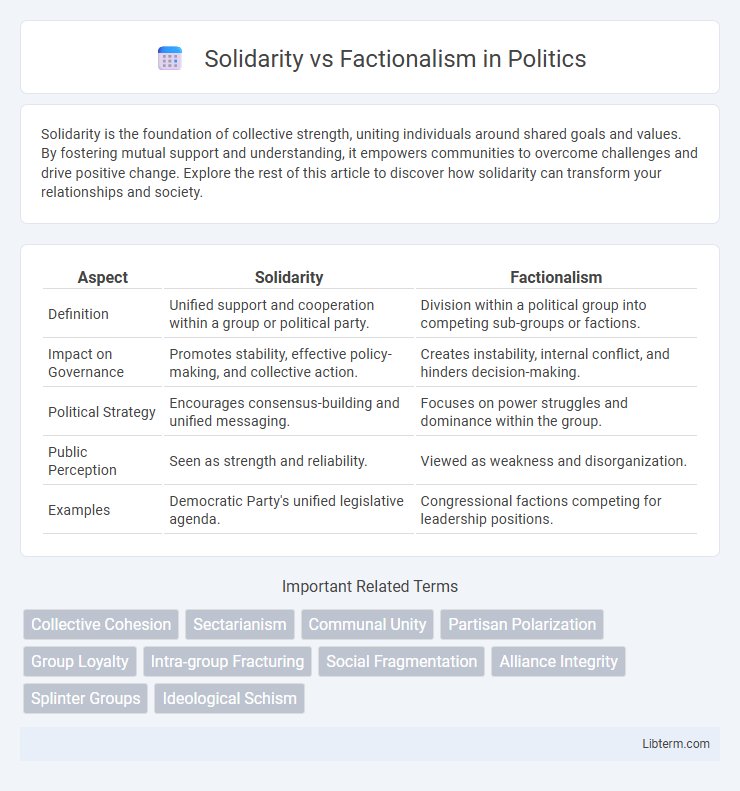Solidarity is the foundation of collective strength, uniting individuals around shared goals and values. By fostering mutual support and understanding, it empowers communities to overcome challenges and drive positive change. Explore the rest of this article to discover how solidarity can transform your relationships and society.
Table of Comparison
| Aspect | Solidarity | Factionalism |
|---|---|---|
| Definition | Unified support and cooperation within a group or political party. | Division within a political group into competing sub-groups or factions. |
| Impact on Governance | Promotes stability, effective policy-making, and collective action. | Creates instability, internal conflict, and hinders decision-making. |
| Political Strategy | Encourages consensus-building and unified messaging. | Focuses on power struggles and dominance within the group. |
| Public Perception | Seen as strength and reliability. | Viewed as weakness and disorganization. |
| Examples | Democratic Party's unified legislative agenda. | Congressional factions competing for leadership positions. |
Understanding Solidarity: Foundations and Principles
Solidarity is grounded in shared values, mutual support, and collective identity, creating a foundation for cooperative action and social cohesion. Principles such as empathy, trust, and inclusivity foster a sense of belonging that transcends individual interests, uniting diverse groups toward common goals. Understanding these foundations highlights how solidarity strengthens community resilience and counters divisive factionalism.
Defining Factionalism: Sources and Drivers
Factionalism arises from competing interests, ideological divides, or power struggles within a group, fragmenting collective unity. Root causes include resource scarcity, identity differences, and leadership ambitions that drive subgroup formation and rivalry. Understanding these drivers helps address conflicts and fosters cohesion through targeted conflict resolution and inclusive governance.
Historical Perspectives on Solidarity and Factionalism
Historical perspectives on solidarity trace back to Emile Durkheim's analysis of social cohesion, distinguishing mechanical solidarity in traditional societies from organic solidarity in modern complex societies. Conversely, factionalism has been studied extensively in the context of political history, notably during factional struggles within the Roman Republic and the Chinese Warring States period, highlighting the destabilizing impact of internal divisions. These historical analyses demonstrate how solidarity fosters unity and social order, while factionalism often leads to conflict and fragmentation within groups.
Social Impacts: Unity Versus Division
Solidarity fosters social cohesion by promoting shared values and collective goals, which strengthens community resilience and enhances cooperation in addressing common challenges. In contrast, factionalism exacerbates social fragmentation, leading to mistrust, conflict, and weakened institutions that hinder effective governance and social progress. The social impact of solidarity lies in unifying diverse groups, while factionalism deepens divisions, ultimately undermining societal stability and collective well-being.
Political Dimensions: Power of Collective Action
Solidarity amplifies political influence by uniting diverse groups under common goals, enhancing the power of collective action to drive policy changes and social reforms. Factionalism, on the other hand, fractures political movements, diluting efforts and weakening the capacity to challenge established power structures. The strength of solidarity lies in cohesion and shared purpose, enabling mobilization that can overcome institutional barriers and achieve significant political outcomes.
Factionalism’s Role in Undermining Movements
Factionalism fractures collective efforts by prioritizing individual or subgroup interests over common goals, leading to internal conflicts and diminished trust among members. This division dilutes resources and weakens the movement's ability to present a unified front, making it vulnerable to external opposition and reducing overall effectiveness. Historical examples show that movements plagued by factionalism often experience stalled progress, as competing agendas overshadow shared objectives.
Case Studies: Successes of Solidarity
Solidarity movements in Poland, South Africa, and India exemplify the power of unified social and political activism in overcoming authoritarian regimes and systemic inequalities. The Polish Solidarity trade union successfully challenged communist rule in the 1980s, leading to democratic reforms and the fall of the Soviet influence in Eastern Europe. Similarly, South Africa's anti-apartheid solidarity efforts, particularly through the African National Congress and international support, played a crucial role in dismantling racial segregation and establishing majority rule.
Case Studies: Dangers of Factionalism
Factionalism undermines organizational cohesion by fostering conflicts that hinder decision-making and stall progress, as evidenced in Zimbabwe's political crisis where party infighting led to economic decline. In corporate settings like Nokia's internal divisions, factional battles weakened unity and contributed to the company's failure to adapt to market changes. Case studies highlight how factionalism damages trust, disrupts collaboration, and ultimately jeopardizes the stability and success of institutions.
Navigating Differences: Strategies for Building Cohesion
Effective strategies for building cohesion amid solidarity and factionalism include fostering open communication channels that encourage empathy and understanding across groups. Implementing conflict resolution techniques, such as mediation and collaborative problem-solving, helps bridge divides and aligns diverse interests toward common goals. Promoting inclusive decision-making processes strengthens unity by valuing all perspectives and minimizing factional tensions.
The Future of Solidarity in a Fragmented World
The future of solidarity in a fragmented world hinges on reinforcing shared values and collective goals that transcend individual group interests. Strengthening inclusive networks and fostering communication across diverse communities can mitigate factionalism and build resilient social cohesion. Emphasizing interdependence and common humanity is essential to counteract divisiveness and promote sustained cooperation.
Solidarity Infographic

 libterm.com
libterm.com